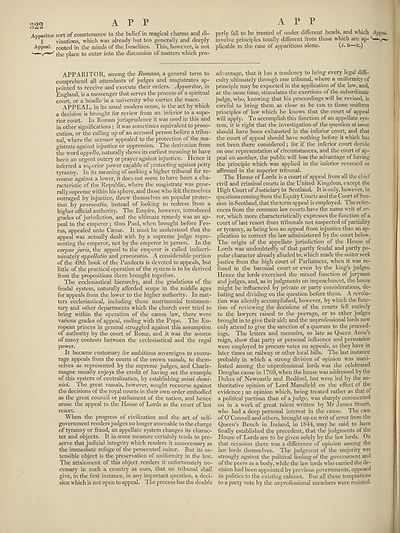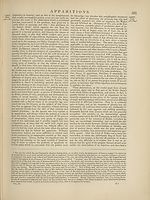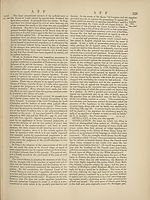Encyclopaedia Britannica > Volume 3, Anatomy-Astronomy
(330) Page 322 - APP
Download files
Complete book:
Individual page:
Thumbnail gallery: Grid view | List view

322
A P P
Apparitor sort of countenance to the belief in magical charms and di¬
ll vinations, which was already but too generally and deeply
Appeal. rooted in the minds of the Israelites. This, however, is not
v—^ the place to enter into the discussion of matters which pro-
A P P
perly fall to be treated of under different heads, and which
involve principles totally different from those which are ap¬
plicable to the case of apparitions alone. (j. b—e.)
APPARITOR, among the Romans, a general term to
comprehend all attendants of judges and magistrates ap¬
pointed to receive and execute their orders. Apparitor, in
England, is a messenger that serves the process of a spiritual
court, or a beadle in a university who carries the mace.
APPEAL, in its usual modem sense, is the act by which
a decision is brought for review from an inferior to a supe¬
rior court. In Roman jurisprudence it was used in this and
in other significations ; it was sometimes equivalent to prose¬
cution, or the calling up of an accused person before a tribu¬
nal, where the accuser appealed to the protection of the ma¬
gistrate against injustice or oppression. The derivation from
the word appello, naturally shows its earliest meaning to have
been an urgent outcry or prayer against injustice. Hence it
inferred a superior power capable of protecting against petty
tyranny. In its meaning of seeking a higher tribunal for re¬
course against a lower, it does not seem to have been a cha¬
racteristic of the Republic, where the magistrate was gene¬
rally supreme within his sphere, and those who felt themselves
outraged by injustice, threw themselves on popular protec¬
tion by provocatio, instead of looking to redress from a
higher official authority. The Empire, however, introduced
grades of jurisdiction, and the ultimate remedy was an ap¬
peal to the emperor ; thus Paul, when brought before Fes-
tus, appealed unto Caesar. It must be understood that the
appeal was actually dealt with by a supreme judge repre¬
senting the emperor, not by the emperor in person. In the
corpus juris, the appeal to the emperor is called indiscri¬
minately appellatio and provocatio. A considerable portion
of the 49th book of the Pandects is devoted to appeals, but
little of the practical operation of the system is to be derived
from the propositions there brought together.
The ecclesiastical hierarchy, and the gradations of the
feudal system, naturally afforded scope in the middle ages
for appeals from the lower to the higher authority. In mat¬
ters ecclesiastical, including those matrimonial testamen¬
tary and other departments which the church ever tried to
bring within the operation of the canon law, there were
various grades of appeal, ending with the Pope. The Eu¬
ropean princes in general struggled against this assumption
of authority by the court of Rome, and it was the source
of many contests between the ecclesiastical and the regal
power.
It became customary for ambitious sovereigns to encou¬
rage appeals from the courts of the crown vassals, to them¬
selves as represented by the supreme judges, and Charle¬
magne usually enjoys the credit of having set the example
of this system of centralization, by establishing missi domi-
nici. The great vassals, however, sought recourse against
the decisions of the royal courts in their own order embodied
as the great council or parliament of the nation, and hence
arose the appeal to the House of Lords as the court of last
resort.
When the progress of civilization and the art of self-
government renders judges no longer amenable to the charge
of tyranny or fraud, an appellate system changes its charac¬
ter and objects. It in some measure certainly tends to pre¬
serve that judicial integrity which renders it unnecessary as
the immediate refuge of the persecuted suitor. But its os¬
tensible object is the preservation of uniformity in the law.
The attainment of this object renders it unfortunately ne¬
cessary in such a country as ours, that no tribunal shall
give, in the first instance, in any important question, a deci¬
sion which is not open to appeal. The process has the double
advantage, that it has a tendency to bring every legal diffi¬
culty ultimately through one tribunal, where a uniformity of
principle may be expected in the application of the law, and,
at the same time, stimulates the exertions of the subordinate
judge, who, knowing that his proceedings will be revised, is
careful to bring them as close as he can to those uniform
principles of law which he knows that the court of appeal
will apply. To accomplish this function of an appellate sys¬
tem, it is right that the investigation of the question at issue
should have been exhausted in the inferior court, and that
the court of appeal should have nothing before it which has
not been there considered; for if the inferior court decide
on one representation of circumstances, and the court of ap¬
peal on another, the public will lose the advantage of having
the principle which was applied in the inferior reversed or
affirmed in the superior tribunal.
The House of Lords is a court of appeal from all the chief
civil and criminal courts in the United Kingdom, except the
High Court of Justiciary in Scotland. It is only, however, in
questions comingfrom the Equity Courts and the Court ofSes-
sion in Scotland, that the term appeal is employed. The refer¬
ences from the common law courts have the name writ of er¬
ror, which more characteristically expresses the function of a
court of last resort from tribunals not suspected of partiality
or tyranny, as being less an appeal from injustice than an ap¬
plication to correct the law administered by the court below.
The origin of the appellate jurisdiction of the House of
Lords was undoubtedly of that partly feudal and partly po¬
pular character already alluded to, which made the suitor seek
justice from the high court of Parliament, when it was re¬
fused in the baronial court or even by the king’s judges.
Hence the lords exercised the mixed function of jurymen
and judges, and, as in judgments on impeachment, the house
might be influenced by private or party considerations, de¬
bating and dividing on the question before them. A revolu¬
tion was silently accomplished, however, by which the func¬
tion of reviewing the decisions of the courts fell entirely
to the lawyers raised to the peerage, or to other judges
brought in to give their aid; and the unprofessional lords now
only attend to give the sanction of a quorum to the proceed¬
ings. The letters and memoirs, so late as Queen Anne’s
reign, show that party or personal influence and persuasion
were employed to procure votes on appeals, as they have in
later times on railway or other local bills. The last instance
probably in which a strong division of opinion was mani¬
fested among the unprofessional lords was the celebrated
Douglas cause in 1769, when the house was addressed by the
Dukes of Newcastle and Bedford, but were led by the au¬
thoritative opinion of Lord Mansfield on the effect of the^
evidence; an opinion which, being treated rather as that of
a political partisan than of a judge, was sharply commented
on in a work of great talent written by Mr James Stuart,
who had a deep personal interest in the cause. The case
of O’Connell and others, brought up on writ of error from the
Queen’s Bench in Ireland, in 1844, may be said to have
finally established the precedent,, that the judgments of the
House of Lords are to be given solely by the law lords. On
that occasion there was a difference of opinion among the
lav/ lords themselves. The judgment of the majority was
strongly against the political feeling of the government and
of the peers as a body, while the law lords who carried the de¬
cision had been appointed by previous governments, opposed
in politics to the existing cabinet. But all these temptations
to a party vote by the unprofessional members were resisted.
A P P
Apparitor sort of countenance to the belief in magical charms and di¬
ll vinations, which was already but too generally and deeply
Appeal. rooted in the minds of the Israelites. This, however, is not
v—^ the place to enter into the discussion of matters which pro-
A P P
perly fall to be treated of under different heads, and which
involve principles totally different from those which are ap¬
plicable to the case of apparitions alone. (j. b—e.)
APPARITOR, among the Romans, a general term to
comprehend all attendants of judges and magistrates ap¬
pointed to receive and execute their orders. Apparitor, in
England, is a messenger that serves the process of a spiritual
court, or a beadle in a university who carries the mace.
APPEAL, in its usual modem sense, is the act by which
a decision is brought for review from an inferior to a supe¬
rior court. In Roman jurisprudence it was used in this and
in other significations ; it was sometimes equivalent to prose¬
cution, or the calling up of an accused person before a tribu¬
nal, where the accuser appealed to the protection of the ma¬
gistrate against injustice or oppression. The derivation from
the word appello, naturally shows its earliest meaning to have
been an urgent outcry or prayer against injustice. Hence it
inferred a superior power capable of protecting against petty
tyranny. In its meaning of seeking a higher tribunal for re¬
course against a lower, it does not seem to have been a cha¬
racteristic of the Republic, where the magistrate was gene¬
rally supreme within his sphere, and those who felt themselves
outraged by injustice, threw themselves on popular protec¬
tion by provocatio, instead of looking to redress from a
higher official authority. The Empire, however, introduced
grades of jurisdiction, and the ultimate remedy was an ap¬
peal to the emperor ; thus Paul, when brought before Fes-
tus, appealed unto Caesar. It must be understood that the
appeal was actually dealt with by a supreme judge repre¬
senting the emperor, not by the emperor in person. In the
corpus juris, the appeal to the emperor is called indiscri¬
minately appellatio and provocatio. A considerable portion
of the 49th book of the Pandects is devoted to appeals, but
little of the practical operation of the system is to be derived
from the propositions there brought together.
The ecclesiastical hierarchy, and the gradations of the
feudal system, naturally afforded scope in the middle ages
for appeals from the lower to the higher authority. In mat¬
ters ecclesiastical, including those matrimonial testamen¬
tary and other departments which the church ever tried to
bring within the operation of the canon law, there were
various grades of appeal, ending with the Pope. The Eu¬
ropean princes in general struggled against this assumption
of authority by the court of Rome, and it was the source
of many contests between the ecclesiastical and the regal
power.
It became customary for ambitious sovereigns to encou¬
rage appeals from the courts of the crown vassals, to them¬
selves as represented by the supreme judges, and Charle¬
magne usually enjoys the credit of having set the example
of this system of centralization, by establishing missi domi-
nici. The great vassals, however, sought recourse against
the decisions of the royal courts in their own order embodied
as the great council or parliament of the nation, and hence
arose the appeal to the House of Lords as the court of last
resort.
When the progress of civilization and the art of self-
government renders judges no longer amenable to the charge
of tyranny or fraud, an appellate system changes its charac¬
ter and objects. It in some measure certainly tends to pre¬
serve that judicial integrity which renders it unnecessary as
the immediate refuge of the persecuted suitor. But its os¬
tensible object is the preservation of uniformity in the law.
The attainment of this object renders it unfortunately ne¬
cessary in such a country as ours, that no tribunal shall
give, in the first instance, in any important question, a deci¬
sion which is not open to appeal. The process has the double
advantage, that it has a tendency to bring every legal diffi¬
culty ultimately through one tribunal, where a uniformity of
principle may be expected in the application of the law, and,
at the same time, stimulates the exertions of the subordinate
judge, who, knowing that his proceedings will be revised, is
careful to bring them as close as he can to those uniform
principles of law which he knows that the court of appeal
will apply. To accomplish this function of an appellate sys¬
tem, it is right that the investigation of the question at issue
should have been exhausted in the inferior court, and that
the court of appeal should have nothing before it which has
not been there considered; for if the inferior court decide
on one representation of circumstances, and the court of ap¬
peal on another, the public will lose the advantage of having
the principle which was applied in the inferior reversed or
affirmed in the superior tribunal.
The House of Lords is a court of appeal from all the chief
civil and criminal courts in the United Kingdom, except the
High Court of Justiciary in Scotland. It is only, however, in
questions comingfrom the Equity Courts and the Court ofSes-
sion in Scotland, that the term appeal is employed. The refer¬
ences from the common law courts have the name writ of er¬
ror, which more characteristically expresses the function of a
court of last resort from tribunals not suspected of partiality
or tyranny, as being less an appeal from injustice than an ap¬
plication to correct the law administered by the court below.
The origin of the appellate jurisdiction of the House of
Lords was undoubtedly of that partly feudal and partly po¬
pular character already alluded to, which made the suitor seek
justice from the high court of Parliament, when it was re¬
fused in the baronial court or even by the king’s judges.
Hence the lords exercised the mixed function of jurymen
and judges, and, as in judgments on impeachment, the house
might be influenced by private or party considerations, de¬
bating and dividing on the question before them. A revolu¬
tion was silently accomplished, however, by which the func¬
tion of reviewing the decisions of the courts fell entirely
to the lawyers raised to the peerage, or to other judges
brought in to give their aid; and the unprofessional lords now
only attend to give the sanction of a quorum to the proceed¬
ings. The letters and memoirs, so late as Queen Anne’s
reign, show that party or personal influence and persuasion
were employed to procure votes on appeals, as they have in
later times on railway or other local bills. The last instance
probably in which a strong division of opinion was mani¬
fested among the unprofessional lords was the celebrated
Douglas cause in 1769, when the house was addressed by the
Dukes of Newcastle and Bedford, but were led by the au¬
thoritative opinion of Lord Mansfield on the effect of the^
evidence; an opinion which, being treated rather as that of
a political partisan than of a judge, was sharply commented
on in a work of great talent written by Mr James Stuart,
who had a deep personal interest in the cause. The case
of O’Connell and others, brought up on writ of error from the
Queen’s Bench in Ireland, in 1844, may be said to have
finally established the precedent,, that the judgments of the
House of Lords are to be given solely by the law lords. On
that occasion there was a difference of opinion among the
lav/ lords themselves. The judgment of the majority was
strongly against the political feeling of the government and
of the peers as a body, while the law lords who carried the de¬
cision had been appointed by previous governments, opposed
in politics to the existing cabinet. But all these temptations
to a party vote by the unprofessional members were resisted.
Set display mode to:
![]() Universal Viewer |
Universal Viewer | ![]() Mirador |
Large image | Transcription
Mirador |
Large image | Transcription
Images and transcriptions on this page, including medium image downloads, may be used under the Creative Commons Attribution 4.0 International Licence unless otherwise stated. ![]()
| Encyclopaedia Britannica > Encyclopaedia Britannica > Volume 3, Anatomy-Astronomy > (330) Page 322 - APP |
|---|
| Permanent URL | https://digital.nls.uk/193761638 |
|---|
| Attribution and copyright: |
|
|---|---|
| Shelfmark | EB.16 |
|---|---|
| Description | Ten editions of 'Encyclopaedia Britannica', issued from 1768-1903, in 231 volumes. Originally issued in 100 weekly parts (3 volumes) between 1768 and 1771 by publishers: Colin Macfarquhar and Andrew Bell (Edinburgh); editor: William Smellie: engraver: Andrew Bell. Expanded editions in the 19th century featured more volumes and contributions from leading experts in their fields. Managed and published in Edinburgh up to the 9th edition (25 volumes, from 1875-1889); the 10th edition (1902-1903) re-issued the 9th edition, with 11 supplementary volumes. |
|---|---|
| Additional NLS resources: |
|

